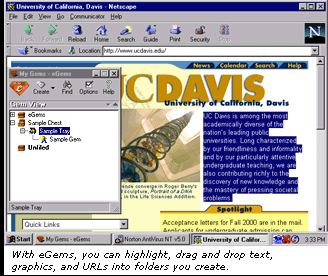 | |
 |
By Andy Jones, English Department
Whereas library visitors once had to familiarize themselves with the card catalogue and microfiche, Web explorers today use newer and perhaps more familiar tools: the Web browser's bookmark and a word processor's copy and paste function. Of course, such conveniences may encourage us to collect information too ambitiously. Especially when working on several projects at once, we may find ourselves adrift in a sea of bookmarks without a clear idea of the source, or even the location, of what once seemed a relevant and useful "gem" of information. Enter eGems, the primary offering of Gemteq Software, Inc., a new company based in Novato (see http://www.egems.com/products for a list of features, benefits and a product demo). eGems (version 1.0) allows users to drag and drop all the treasures found on the Web (links, graphics, and text passages) into organized compartments, appropriately described in jewelers' lingo as "trays" and "chests" (basically folders or directories within a database). As Gemteq's Ashwin Gulati recently demonstrated to a room filled with curious UC Davis professors and researchers at the Arbor, eGems allows its users to collect and organize useful information without interrupting work on other projects.

Taking the graphic form of a small red "gem," the entire eGems application sits unobtrusively on oneีs browser or desktop, waiting for information collected from the Web, word processing and spreadsheet applications, or from the user's imagination. Once a passage of text, graphic image, or URL address is dragged and dropped into the eGems folder you have set up for your project, it can be organized according to project, theme, or genre. The most relevant "gems" of information can appear in multiple trays or chests, with "links" to pertinent data elsewhere in the growing eGems database. This central repository of information--all organized, cross-referenced, and cited with relevant Web-available bibliographic information--encourages the researcher or writer to keep track of thoughts and resources, as well as to make connections more easily than if all this information were scattered across various applications and folders on one's hard drive. The application also allows collaboration with friends and colleagues so that an entire database of information can be easily shared via email. The program also offers an advanced search tool to quickly locate information stored in the database. A demo of eGems can be downloaded from Gemteq at http://www.egems.com/. The program can be purchased from the campus bookstore for $34.95. Currently, the product is available only for Windows-based computers. To run the program, you will need a Pentium 120 or higher with a minimum of 32 MB RAM. Gemteq has stated that it will make a Web-based version of eGems available for Macintosh and Linux users.
|